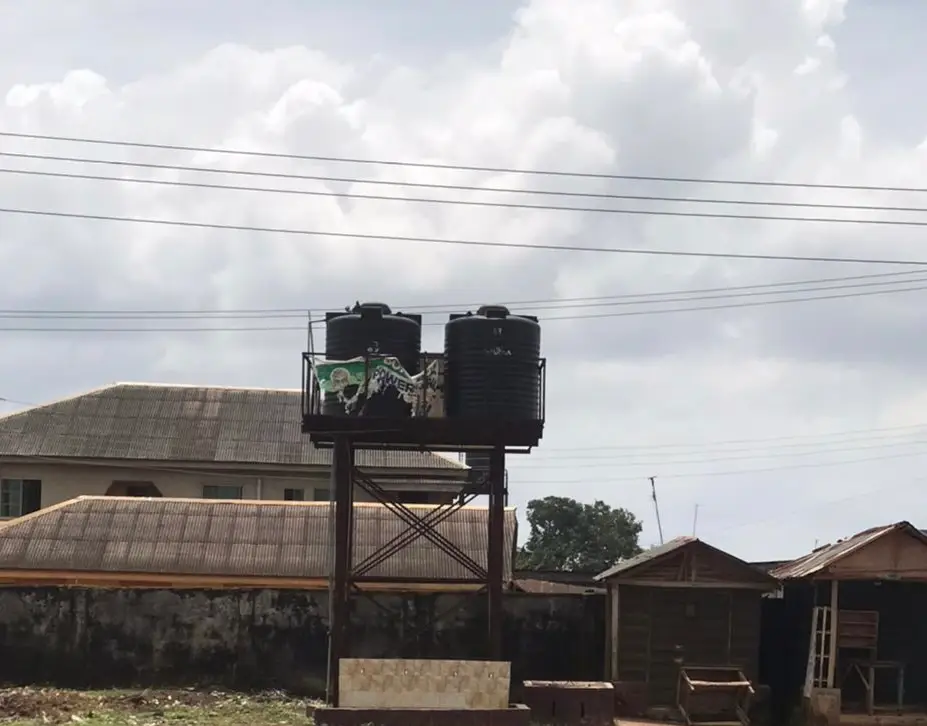For several years, residents of Sheu Shagari Estate, a low-cost area in Epe District in Lagos state waited for the government to fulfill its promises in giving them water. When the help finally came, it was the construction of two boreholes in each section of the estate by Honorable Raji, and Sabit Aderemi, two popular politicians in the area.
However, a few years later, one of the boreholes, the one situated at line AA constructed in 2017, has stopped working while the other one at line AC that was constructed earlier in 2010 continues serving the people. Queried on why newest borehole stopped working, Abu Aishat, a member of the line AC said the reason is not that the borehole was badly constructed — as was popularly conceived, but that it lacked the required maintenance.
“The issue is that since the day our own borehole was commissioned we sat down and we deliberated on how to sustain it so we won’t be starving for water. That was how we concluded that everyone pay a token every time they fetch water from the borehole.
“This token is not for us to share or to do anything but to maintain the borehole. For instance, if there is no electricity we usually use the money to buy petrol to fuel the generator and make sure there is available water in the tank. I will even say that the second borehole that was built by Hon. Raji is big and has more standards but the maintenance makes ours still functioning.”
The Water Problem
A report by the WaterAid organization estimates that only 19% of the population in Nigeria has access to basic sanitation facilities, and 60 million people lack access to safe water. In 2018, the Nigerian government declared a state of emergency in the water sector due to the high percentage of the population without access to safe water. However, this emergency obviously does not reach the people in Sheu Shagari estate.
Balikisu Abidamo, a resident of the estate, wakes up earlier than expected to fetch water for daily needs. Speaking with THE LIBERALIST, she stated that the fact that Epe is neighboring water should not have a water problem. Yet, she suffers every day to get water.
“If this borehole that is even close to us [referring to the borehole in line AA] here is working, it will have been easy for us but it is not working and we need to go to another one that is far from us at line AC to have water everyday.”
With the borehole at line AA not working, more people now visit the one at line AC. Afusat Tijani who lives in Line AC said she has to go through stress everyday because of the crowd wanting to fetch water from the borehole.
“Even though the borehole is closer to my house, we still follow queues which are full of stress. Even when we have to pay for the water. But it is still better than none at least.”
A resident of Sheu Shagari estate and one of the committee tasked with the maintenance of the borehole in line AA, who preferred not to mention his name, said the borehole is built with solar panels but there was a time something was stolen from the engine room and since then the community has refused to do anything to replace it.
The issue of a community being creative in solving problems is not unique to Shehu Shagari Estate. Doctor Hassan Akewusola, a senior lecturer at Michele Otedola College of Primary Education, explains that many communities no longer trust the government to provide basic amenities, as they often end up with substandard infrastructure. This has led to communities taking matters into their own hands to solve their problems.
Mr. Shabi, one of the landlords in the community, believes that if other communities could copy the style of line AC, a lot of community development could be achieved.
“This is not the first time this community is taking matters into its own hands and not waiting for the government,” he said. He cited the community’s contribution to security issues, such as numbering cars permanently parked in the location and securing gates and junctions with guards, as examples of the community’s development efforts.
“We can say that a part of Shehu Shagari Estate in Lagos has found a solution to the water scarcity issue by maintaining the borehole through token payments. The community’s efforts to solve this problem without waiting for the government’s intervention can serve as a model for other communities facing similar issues.”













